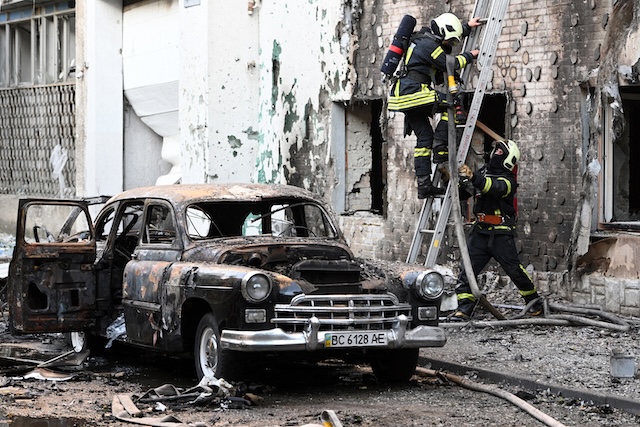Commentary: Trump’s toothless threats against Putin will do little to end the war
Published 9:26 am Friday, July 18, 2025

- Firefighters are seen next to a burnt-out car following mass Russian drone and missile strikes in the western Ukrainian city of Lviv on July 12. (Photo by YURIY DYACHYSHYN/AFP via Getty Images)
LONDON — In case anyone believes President Donald Trump has revised his policy toward Vladimir Putin’s war on Ukraine, don’t be fooled.
True, the president is piqued because Putin refuses to agree to Trump’s Nobel Peace Prize plan for a ceasefire with Ukraine. The Russian leader has been deluging Ukraine’s cities with drones and missiles despite a half dozen phone calls from Trump, with the biggest barrage right after the U.S. leader hung up from the last call.
Trump finally seems to grasp that Putin is making a fool of him in the eyes of the entire world. But the president’s much-awaited “big announcement” on Ukraine gave Putin another dangerous pass.
Trending
After repeatedly announcing and then ignoring his previous deadlines, Trump issued yet another, declaiming that unless Putin agreed to a ceasefire in 50 days, he would impose “severe” tariffs on Moscow. Tough talk, but the United States does almost no trade with Russia, so the threat of tariffs is meaningless — even if this time, Trump takes his own deadline seriously.
Moreover, Russia is in the midst of a furious summer offensive, trying to destroy Ukraine’s civilian infrastructure and break the country’s morale in the next couple of months. So a 50-day time frame, backed by a threat the Kremlin knows is meaningless, gives Putin a green light to pour it on.
Now, Trump indicates he might support a languishing Senate bill, with 85 Republican and Democratic sponsors, to impose secondary sanctions on countries that purchase Russian energy. Passage of the Senate bill, with Trump’s blessing, would allow him to claim he was acting tough when, in reality, he was still permitting Putin to ravage Ukraine.
But again, reality bites. Trump has insisted the bill include a carve-out that allows him to choose whether to sanction Russia at all. And he has told GOP senators to pause their sanctions bill for 50 days to see if his threats will scare Putin, an ex-KGB colonel who knows well that if Trump really wanted to sanction Russia further, he could do it on his own.
The only good news is that, despite refusing to permit new U.S. aid for Ukraine, Trump now says he will allow NATO countries to purchase U.S.-made weapons to pass on to Kyiv. This way, he can claim he is doing business, even as he refuses to recognize the moral and strategic imperative of preventing the Kremlin from destroying Ukraine.
Here, too, there is less to this “reversal” than meets the eye.
Trending
Kyiv desperately needs certain key weapons systems immediately to blunt Russia’s summer offensive. Prime among them are air defenses, especially Patriot systems, as well as the interceptor missiles they fire. Kyiv has only eight to 10 of the systems and needs another 10 or so to save its civilian infrastructure. The Patriots are the only means to defend against Russian ballistic missiles that are striking Ukraine’s cities every day.
A meager 30 interceptor missiles, part of a package agreed and financed under President Joe Biden, were recently halted by order of the Pentagon when they were already in transit. Under pressure, Trump supposedly countermanded that order with great fanfare. But, in reality, only 10 missiles will be delivered, barely enough for a couple of weeks. As for letting the Europeans purchase more urgently needed Patriot systems for Kyiv, here, too, the prospects are still dicey.
To sum up, it is a good thing that, after cutting off new U.S. weapons delivery to Ukraine, Trump has finally been moved by Putin’s insults to green light deliveries of U.S. weapons via NATO — so long as the Europeans pay. But the need for those weapons deliveries — especially the Patriot systems and interceptor missiles — is right now.
Moreover, the president still refuses to recognize that Putin has no interest whatsoever in a ceasefire or peace talks if they don’t include Ukraine’s surrender to Moscow’s control. The Russian leader will never come to the table unless the cost of the war becomes too high politically and economically for the Kremlin to bear.
Trudy Rubin is a columnist and editorial-board member for The Philadelphia Inquirer.








